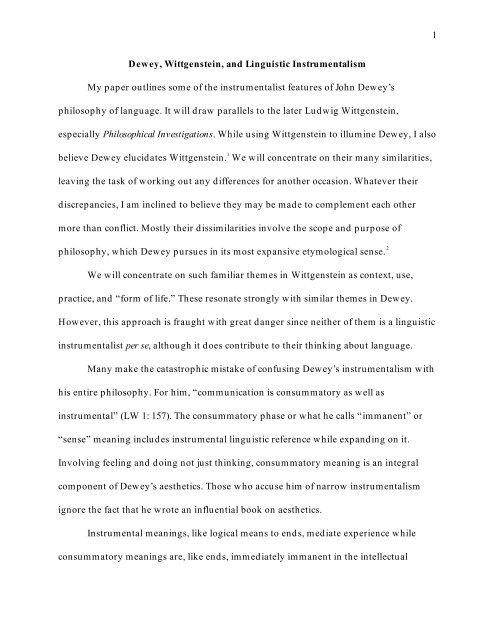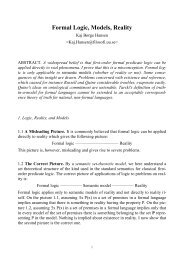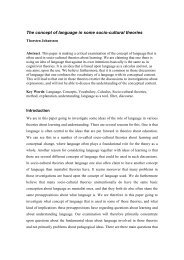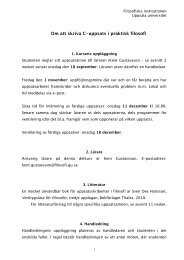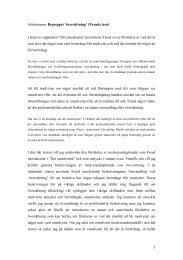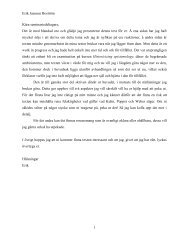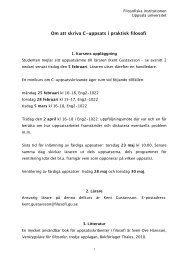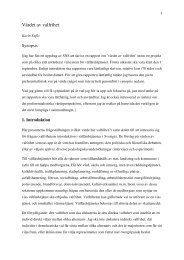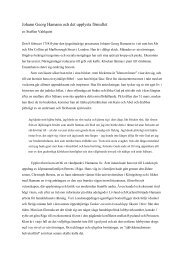1 Dewey, Wittgenstein, and Linguistic Instrumentalism My paper ...
1 Dewey, Wittgenstein, and Linguistic Instrumentalism My paper ...
1 Dewey, Wittgenstein, and Linguistic Instrumentalism My paper ...
You also want an ePaper? Increase the reach of your titles
YUMPU automatically turns print PDFs into web optimized ePapers that Google loves.
<strong>Dewey</strong>, <strong>Wittgenstein</strong>, <strong>and</strong> <strong>Linguistic</strong> <strong>Instrumentalism</strong><br />
<strong>My</strong> <strong>paper</strong> outlines some of the instrumentalist features of John <strong>Dewey</strong>’s<br />
philosophy of language. It will draw parallels to the later Ludwig <strong>Wittgenstein</strong>,<br />
especially Philosophical Investigations. While using <strong>Wittgenstein</strong> to illumine <strong>Dewey</strong>, I also<br />
believe <strong>Dewey</strong> elucidates <strong>Wittgenstein</strong>. 1 We will concentrate on their many similarities,<br />
leaving the task of working out any differences for another occasion. Whatever their<br />
discrepancies, I am inclined to believe they may be made to complement each other<br />
more than conflict. Mostly their dissimilarities involve the scope <strong>and</strong> purpose of<br />
philosophy, which <strong>Dewey</strong> pursues in its most expansive etymological sense. 2<br />
We will concentrate on such familiar themes in <strong>Wittgenstein</strong> as context, use,<br />
practice, <strong>and</strong> “form of life.” These resonate strongly with similar themes in <strong>Dewey</strong>.<br />
However, this approach is fraught with great danger since neither of them is a linguistic<br />
instrumentalist per se, although it does contribute to their thinking about language.<br />
Many make the catastrophic mistake of confusing <strong>Dewey</strong>’s instrumentalism with<br />
his entire philosophy. For him, “communication is consummatory as well as<br />
instrumental” (LW 1: 157). The consummatory phase or what he calls “immanent” or<br />
“sense” meaning includes instrumental linguistic reference while exp<strong>and</strong>ing on it.<br />
Involving feeling <strong>and</strong> doing not just thinking, consummatory meaning is an integral<br />
component of <strong>Dewey</strong>’s aesthetics. Those who accuse him of narrow instrumentalism<br />
ignore the fact that he wrote an influential book on aesthetics.<br />
Instrumental meanings, like logical means to ends, mediate experience while<br />
consummatory meanings are, like ends, immediately immanent in the intellectual<br />
1
eference. Immanent meanings provide a richer underst<strong>and</strong>ing <strong>and</strong> appreciation of an<br />
otherwise cold proposition. They are the unity not just of the thought that went into<br />
arriving at the conclusion or reference, but also of the feeling <strong>and</strong> action. It is largely a<br />
matter of distinguishing linguistic reference from an embodied, habitualized, <strong>and</strong> felt<br />
consummatory qualitative experience of the self in practical dynamic unity with the<br />
world, which the reference provides as an aid to coordinating our activity. 3<br />
While an ardent anti-dualist, <strong>Dewey</strong> is always willing to support subtle<br />
distinctions as long as we do not hypostatize them. Here is a particularly relevant<br />
example where he distinguishes among three aspects of experience:<br />
It is not possible to divide in a vital experience the practical, emotional, <strong>and</strong><br />
intellectual from one another <strong>and</strong> to set the properties of one over against the<br />
characteristics of the others. The emotional phase binds parts together into a<br />
single whole; “intellectual” simply names the fact that the experience has<br />
meaning; “practical” indicates that the organism is interacting with events <strong>and</strong><br />
objects which surround it. (LW 10: 61)<br />
Instrumental, referential, or what <strong>Dewey</strong> calls “significant” meanings emphasize the<br />
intellectual component of vital experience, while immanent meaning includes the other<br />
two phases in proper dynamic equilibrium. Immanent meanings involve an<br />
underst<strong>and</strong>ing, appreciation, perhaps even an enjoyment that depends on the prior<br />
achievement of objective intellectual reference. Because they are not cognitive, the<br />
affective <strong>and</strong> practical features are, in themselves, inarticulate. At best, words may only<br />
gesture toward them, yet they matter immensely in the wise conduct of life.<br />
2
Ignoring <strong>Dewey</strong>’s aesthetic dimension has disastrous consequences for<br />
comprehending his philosophy, including his philosophy of language. In Art as<br />
Experience, <strong>Dewey</strong> writes: “works of art are the only media of complete <strong>and</strong> unhindered<br />
communication between man <strong>and</strong> man that can occur in a world full of gulfs <strong>and</strong> walls<br />
that limit community of experience” (LW 10: 110). The artful use of language may<br />
achieve unhindered communication by creating a community of shared aesthetic<br />
communion. <strong>Dewey</strong> declares:<br />
Communication is uniquely instrumental <strong>and</strong> uniquely final. It is instrumen tal as<br />
liberating us from the otherwise overwhelming pressure of events <strong>and</strong> enabling<br />
us to live in a world of things that have meaning. It is final as a sharing in the<br />
objects <strong>and</strong> arts precious to a community, a sharing whereby meanings are<br />
enhanced, deepened <strong>and</strong> solidified in the sense of communion . . . . Here, as in so<br />
many other things, the great evil lies in separating instrumental <strong>and</strong> final<br />
functions. (LW 1: 159)<br />
As in poetry, proper non-instrumental use of language shows as well as says. We may<br />
create images with words. <strong>My</strong> insufficient discussion of <strong>Dewey</strong>’s consummatory<br />
“immanent meaning” implies a great evil of omission.<br />
I also wrong <strong>Wittgenstein</strong>. While we are mostly interested in his later work, the<br />
Tractatus already asserts that the richer meanings language seeks to communicate can<br />
only be shown, not said. At best, we may only point to them with words. “What we<br />
cannot speak about,” <strong>Wittgenstein</strong> (1922/ 2009) famously concludes, “we must pass<br />
over in silence” (§ 7). We get a clue as to what he is up to from his approving response<br />
3
to a poem sent to him by his friend Paul Engelmann: “And that is how it is: if only you<br />
do not try to utter what is unutterable then nothing gets lost. But the unutterable will be<br />
—unutterably—contained in what has been uttered” (Monk, 1990, 151). 4 One will never<br />
grasp the meaning of a poem if all one comprehends are its references. We may say the<br />
same of science, mathematics, logic, or any other intelligent activity theoretical or<br />
practical. Full underst<strong>and</strong>ing involves appreciating <strong>and</strong>, perhaps, enjoying inarticulate<br />
meanings that include linguistic reference, but go beyond it. We need a feel for the<br />
subject matter if we are to know what to do with it.<br />
<strong>Wittgenstein</strong>’s discussion of experience along with the distinction between<br />
“imponderable” <strong>and</strong> “documentary” evidence in Philosophical Investigations shares<br />
many similarities with <strong>Dewey</strong>’s distinction between “immanent” <strong>and</strong> “significant”<br />
meaning. <strong>Wittgenstein</strong> believes, “Imponderable evidence includes subtleties of glance,<br />
of gesture, of tone” (PI II § 228). Therefore, ”I may recognize a genuine loving look,<br />
distinguish it from a pretended one . . . . But I may be quite incapable of describing the<br />
difference. And this not because the languages I know have no words for it ” (228).<br />
With sufficient experience, almost everyone in all cultures learn to interpret someone’s<br />
mood by their facial gestures (See Ekman, 1973). It is easy to recognize fake smiles while<br />
few can say why. However, there is plenty of documentary (i.e., scientific) ev idence that<br />
fake smiles only involve the muscles around the mouth. <strong>Wittgenstein</strong> (1982) affirms:<br />
“An important fact here is that we learn certain things only through long experience<br />
<strong>and</strong> not from a course in school. How, for instance, does one develop the eye of a<br />
connoisseur?” (§ 925). His example is fine art. Most of us are connoisseurs of faces. Few<br />
4
ecome connoisseurs of fine art, but fundamentally there is little difference; both<br />
involve a felt consummatory appreciation of inarticulate meanings that can only be<br />
shown not said, yet the showing clearly has a determinate reference. 5<br />
<strong>Dewey</strong> rejects the traditional Western notion of language such as we find in John<br />
Locke (1690/ 1959) who argues:<br />
Besides articulate sounds, therefore, it was further necessary th at we should be<br />
able to use these sounds as signs of internal conceptions; <strong>and</strong> to make them st<strong>and</strong><br />
as marks for the ideas within his own mind, whereby they might be made known<br />
to others, <strong>and</strong> the thoughts of men’s minds be conveyed from one to another.<br />
(Book III, 3)<br />
Locke provides an instance of the picture theory of meaning that <strong>Wittgenstein</strong> himself<br />
held in the Tractatus. Locke’s position is similar mutatus mut<strong>and</strong>is to that of Rene<br />
Descartes, Ferdin<strong>and</strong> de Saussure, Edmund Husserl, St. Augustine as portrayed in<br />
<strong>Wittgenstein</strong>, <strong>and</strong> Jerry Foder’s Turing machine functionalism. What computers cannot<br />
do is process “immanent meaning” to achieve consummatory qualitative experience.<br />
They can only recursively churn out references as the next line of a program, but these<br />
will lack the emotional unity <strong>and</strong> practical interaction with events that comprise vital<br />
experience. A computer can no more properly interpret a poem than it can prove all the<br />
propositions of first order logic, although first order logic is formally complete. 6<br />
An untenable inner versus outer dualism, of which the dualisms of mind vs.<br />
body <strong>and</strong> knower vs. known are merely special cases, haunts most notions of language<br />
ancient, modern, or post-modern along with the correspondence theory of truth. <strong>Dewey</strong><br />
5
ejects all such dualisms along with correspondence. The notion that the mind should<br />
reflect external reality provides Richard Rorty (1979) with the title of Philosophy <strong>and</strong> the<br />
Mirror of Nature. There, he stridently challenges traditional philosophy of language <strong>and</strong><br />
epistemology.<br />
One of the most influential essays in analytic philosophy written by one of its<br />
most renowned proponents is W. V. O. Quine’s (1969) “Ontological Relativity.” It was<br />
the first annual <strong>Dewey</strong> lecture at Columbia University. What he says there goes a long<br />
way toward establishing the similarity between <strong>Wittgenstein</strong> <strong>and</strong> <strong>Dewey</strong>’s depiction of<br />
linguistic “use” <strong>and</strong> “context.” Quine finds: “Philosophically I am bound to <strong>Dewey</strong> by<br />
the naturalism that dominated his last three decades. With <strong>Dewey</strong> I hold that<br />
knowledge, mind, <strong>and</strong> meaning are part of the same world . . . . There is no place for a<br />
prior philosophy” (26). He further adds that, like <strong>Dewey</strong>, when discussing the<br />
philosophy of mind, he turns to linguistic meaning to comprehend higher mental<br />
functioning. <strong>Linguistic</strong>ally, he too wishes to avoid “pernicious mentalism” in semantics<br />
(27).<br />
In opposing mentalisms of all kind s, Quine cites <strong>Dewey</strong> in support of his own<br />
position: “Meaning . . . is not a psychic existence; it is primarily a property of behav ior”<br />
(27). Here is how Quine expresses his own opinion:<br />
Meanings are, first <strong>and</strong> foremost, meanings of language. Language is a social art<br />
which we all acquire on the evidence solely of other people’s overt behavior<br />
under publicly recognizable circumstances. Meanings, therefore, those very<br />
models of mental entities, end up as grist for the behaviorist’s mill. (26)<br />
6
He goes on to mention that once we underst<strong>and</strong> the use of language in its social context,<br />
we will realize there can be no private language. Again, h e cites <strong>Dewey</strong>: “ ‘Soliloquy,’<br />
he wrote, ‘is the product <strong>and</strong> reflex of converse with others’ “ (27). He cites yet another<br />
passage to enlarge the point: “Language is specifically a mode of interaction of at least<br />
two beings, a speaker <strong>and</strong> a hearer; it presup poses an organized group to which these<br />
creatures belong, <strong>and</strong> from whom they have acquired their habits of speech. It is<br />
therefore a relationship” (27). Quine acknowledges that his own stance owes much to<br />
<strong>Wittgenstein</strong> <strong>and</strong> <strong>Dewey</strong> before commenting: “Years later, <strong>Wittgenstein</strong> likewise<br />
rejected private language. When <strong>Dewey</strong> was writing in this naturalistic vein,<br />
<strong>Wittgenstein</strong> still held his copy theory of language” (27). Quine goes on to review the<br />
usual complaints against the uncritical semantics of the museum theory of meaning that<br />
<strong>Wittgenstein</strong> associates with his earlier self <strong>and</strong> Augustine in Philosophical Investigations.<br />
These criticisms readily extend, mutatis mut<strong>and</strong>is, to dualistic theories like that of Fodor<br />
<strong>and</strong> others already mentioned.<br />
Inspired by Quine <strong>and</strong> others, Richard Rorty (1979) famously combined them<br />
with <strong>Wittgenstein</strong>, <strong>Dewey</strong>, <strong>and</strong> Martin Heidegger to advance his own “epistemological<br />
behaviorism” conjoined with what he called “the linguistic turn.” 7 He takes on various<br />
versions of Descartes’ correspondence theory of truth, which assumes that we have<br />
truth when inner mental representations mirror the events <strong>and</strong> objects of nature.<br />
Relying on <strong>Dewey</strong> <strong>and</strong> <strong>Wittgenstein</strong> inspired arguments, Rorty eliminates not only the<br />
very idea of “the mind” as traditionally conceived, but also the entirety of epistemology<br />
7
as the pursuit of what <strong>Dewey</strong> calls “the quest for certainty.” 8<br />
Rorty specifically<br />
challenges Fodor (220 <strong>and</strong> elsewhere).<br />
Quine (1969) writes: “When we turn thus toward a naturalistic view of language<br />
<strong>and</strong> a behavioral view of meaning, what we give up is not just the museum figure of<br />
speech. We give up an assurance of determinacy” (28). He is correct. Quine uses<br />
<strong>Wittgenstein</strong> <strong>and</strong> <strong>Dewey</strong> to develop his own thesis of “ontological” indeterminacy,<br />
which goes far beyond the indeterminacy of ordinary translation:<br />
When . . . we recognize with <strong>Dewey</strong> that “meaning . . . is primarily a property of<br />
behavior,” we recognize that there are no meanings, nor likenesses nor<br />
distinctions of meaning, beyond what are implicit in people’s dispositions to<br />
overt behavior . . . . If by these st<strong>and</strong>ards there are indeterminate cases, so much<br />
the worse for the terminology of meaning <strong>and</strong> likeness of meaning. (29)<br />
In Quine’s “Ontological Relativity,” things turn out much the worse. The cor e of the<br />
argument derives from Quine’s example of an ostensive definition of “rabbit” in a<br />
hypothetical culture that uses “gavagai.” The ontological question is: Does it mean<br />
rabbit, “undetached rabbit part,” “rabbit stage,” or something else (30). The problem is<br />
that ostensive definition regardless of however much we come to agreement in action,<br />
fails to ultimately fix the meaning of “rabbit,” which may have an endless array of<br />
ontological assemblages. Identical twins raised in the same happy home may never be<br />
sure that they are in ontological agreement.<br />
With two such instances of internationally recognized philosophers such as<br />
Quine <strong>and</strong> Rorty not merely noting the similarity, but making extensive use of it to<br />
8
develop their own widely influential philosophical programs, it is remarkable that the<br />
resemblance between <strong>Wittgenstein</strong> <strong>and</strong> <strong>Dewey</strong> have not been more richly explored. 9 I<br />
do worry about their use of the word “behaviorism.” Quine <strong>and</strong> Rorty may somewhat<br />
misrepresent <strong>Dewey</strong> <strong>and</strong> <strong>Wittgenstein</strong>. <strong>Dewey</strong> worked out his ideas about language,<br />
intentionality, <strong>and</strong> mental functioning in collaboration with his long-time friend <strong>and</strong><br />
colleague George Herbert Mead. It might have helped if <strong>Dewey</strong> had used Mead’s<br />
phrase “social behaviorism” to describe linguistic activity. 10 However, a close reading of<br />
<strong>Dewey</strong> <strong>and</strong> <strong>Wittgenstein</strong> shows they more frequently use the word “action,” <strong>and</strong><br />
especially socially structured action. For instance, here is a typical <strong>Wittgenstein</strong>ian<br />
connection between words <strong>and</strong> a context of social action:<br />
We can also think of the whole process of using words . . . as one of those games<br />
by means of which children learn their native language. I shall . . . call the whole,<br />
consisting of language <strong>and</strong> the actions into which it is woven, the ‘language-<br />
game.’ (PI § 7)<br />
Examples like this one make it worth remembering that <strong>Wittgenstein</strong> <strong>and</strong> <strong>Dewey</strong> were<br />
former schoolteachers. The passage illustrates an instance of social learning. It is part of<br />
what we might call the pedagogical turn in the later <strong>Wittgenstein</strong> (see Macmillan, 1983).<br />
<strong>Wittgenstein</strong> frequently uses pedagogical examples, especially in On Certainty (1972),<br />
but we find many similar references in Philosophical Investigations (1953). Of course,<br />
<strong>Dewey</strong> was one of the most famous educators of the Twentieth-Century. In reference to<br />
Quine, it is useful to remember that <strong>Wittgenstein</strong> found “ostensive teaching of words”<br />
<strong>and</strong> training more fundamental than ostensive definition (PI § 6). <strong>Dewey</strong> simply says,<br />
9
“language is primarily a mode of action” (LW 1: 160). <strong>Dewey</strong> means social action of<br />
which teaching is a fine example. Elsewhere, <strong>Wittgenstein</strong> writes, “words are deeds”<br />
(CV 46). The word “deed” is especially cordial for pragmatists (pragma in ancient Greek<br />
meant “deed”). Below, I will use words like action, activity, deed, operation, <strong>and</strong><br />
practice interchangeably with behavior. 11<br />
<strong>Wittgenstein</strong> <strong>and</strong> <strong>Dewey</strong> (Heidegger as well) assert the primacy of social practice<br />
as the context for linguistic practice. <strong>Wittgenstein</strong> maintains that “the term ‘language-<br />
game’ is meant to bring into prom inence the fact that the speaking of language is part of<br />
an activity, or of a form of life” (PI § 23). Meanwhile, <strong>Dewey</strong> insists, “we have to be able<br />
to re-state the whole social context which alone supplies the meaning” (LW 1: 160).<br />
Most philosophers are familiar with what we might call the builders' language-game<br />
early in the Investigations. In this game, language enables communication between a<br />
builder A <strong>and</strong> an assistant B. They are building with blocks, pillars, slabs, <strong>and</strong> beams. B<br />
has to pass the materials in the order in which A needs them (PI § 2). One possible<br />
move in this game involves the request: “Bring me a slab” (PI § 19 ff.). Now compare<br />
<strong>Wittgenstein</strong>’s slab game to the following example of what we might call <strong>Dewey</strong>’s<br />
flower game:<br />
A requests B to bring him something, to which A points, say a flower. There is an<br />
original mechanism by which B may react to A's movement in pointing. But<br />
natively such a reaction is to the movement, not to the pointing, not to the object<br />
pointed out. But B learns that the movement is a pointing; he responds to it not in<br />
itself, but as an index of something else. His response is transferred from A's<br />
10
direct movement to the object to which A points. Thus he does not merely execute<br />
the natural acts of looking or grasping which the movement might instigate on<br />
its own account. The motion of A attracts his gaze to the thing pointed to; then,<br />
instead of just transferring his response from A's movement to the native reaction<br />
he might make to the thing as stimulus, he responds in a way which is a function<br />
of A's relationship, actual <strong>and</strong> potential, to the thing. The characteristic thing<br />
about B's underst<strong>and</strong>ing of A's movement <strong>and</strong> sounds is that he responds to the<br />
thing from the st<strong>and</strong>point of A. He perceives the thing as it may function in A's<br />
experience, instead of just ego-centrically [sic]. . . . Such is the essence <strong>and</strong> import<br />
of communication, signs <strong>and</strong> meaning. Something is literally made common in at<br />
least two different centres of behavior. To underst<strong>and</strong> is to anticipate together, it<br />
is to make a cross-reference which, when acted upon, brings about a partaking in<br />
a common, inclusive, undertaking. (LW 1: 140-141)<br />
Notice the importance of coordinating action with regard to some object literally made<br />
common in action. It is a three-term relationship involving A <strong>and</strong> B taking each other’s<br />
attitude with regard to a third thing, the referent (e.g., a slab or flower). This functional<br />
coordination resonates with <strong>Wittgenstein</strong>’s slab game (see especially PI §§ 18-21).<br />
If there is a difference between <strong>Wittgenstein</strong> <strong>and</strong> <strong>Dewey</strong>, it is that <strong>Dewey</strong> is not<br />
only offering a philosophy of language, but also a theory whereas the later <strong>Wittgenstein</strong><br />
eschews theory <strong>and</strong> argumentation in terms of describing linguistic games. O ften, he<br />
presents them pedagogically in terms of how someone like A might teach a tyro like B<br />
how to use words correctly within a form of life. Significantly, we now have extensive<br />
11
empirical research supporting this “theory” of language (see Tomasello 1999, 2008a, <strong>and</strong><br />
2008b). 12 We also now know that having mirror neurons is immensely helpful in taking<br />
the attitude of the other for organisms such as ourselves <strong>and</strong> many other species. 13<br />
While decrying scientism <strong>and</strong> the pretense of even good science to completing the quest<br />
for certainty, <strong>Dewey</strong> nonetheless thought philosophy participated in both literature <strong>and</strong><br />
empirical science. 14 Meanwhile, <strong>Wittgenstein</strong> insists that philosophy is separate from<br />
science (see Tractatus § 4.111 <strong>and</strong> PI § 109).<br />
Many consider <strong>Wittgenstein</strong>’s remarks on private language, “form of life,” <strong>and</strong><br />
grammar, or conventional normative rules-governed linguistic activity, as the most<br />
prominent notions in the Investigations. They are all intimately connected. Let us<br />
compare some remarkably resonate passages in <strong>Dewey</strong> on similar themes. We begin<br />
with the argument against private language. For <strong>Wittgenstein</strong>, a private-language, in<br />
which “individual words . . . are to refer to what can only be known to the person<br />
speaking; to his immediate private sensations” is not a genuine, meaningful, rule-<br />
governed language (PI § 243). The signs in language can only function when there is a<br />
possibility of judging the correctness of their use; so, “the use of [a] word st<strong>and</strong>s in need<br />
of a justification which everybody underst<strong>and</strong>s” (PI § 261). Compare <strong>Wittgenstein</strong> to<br />
<strong>Dewey</strong>: “Primarily meaning is intent <strong>and</strong> intent is not personal in a private <strong>and</strong><br />
exclusive sense” (LW 1: 142). <strong>Dewey</strong> finds that if “we had not talked with others <strong>and</strong><br />
they with us, we should never talk to <strong>and</strong> with ourselves” (135). Indeed, for <strong>Dewey</strong>, to<br />
have a mind at all is to have meaning: “Through speech a person dramatically identifies<br />
himself with potential acts <strong>and</strong> deeds; he plays many roles, not in successive stages of<br />
12
life but in a contemporaneously enacted drama. Thus mind emerges” (135). We owe our<br />
minds <strong>and</strong> selves to others, our family, community, <strong>and</strong> public institutions.<br />
The following is a fine statement of the importance of forms of life for <strong>Dewey</strong>’s<br />
theory of language with a stunning bonus at the end:<br />
Language is specifically a mode of interaction of at least two beings, a speaker<br />
<strong>and</strong> a hearer; it presupposes an organized group to which these creatures belong,<br />
<strong>and</strong> from whom they have acquired their habits of speech. It is therefore a<br />
relationship, not a particularity. This consideration alone condemns traditional<br />
nominalism. (LW 1: 145)<br />
The added advantage is that participating in structured social relations requires a role<br />
for universals, however restricted (perhaps to only a linguistic community of two; for<br />
example, a builder <strong>and</strong> assistant). For <strong>Dewey</strong>, “every meaning is generic or universal; it<br />
is something common between speaker, hearer <strong>and</strong> the thing to which speech refers”<br />
(147). The following from <strong>Wittgenstein</strong> says something similar:<br />
And hence also ‘obeying a rule’ is a practice. And to think one is obeying a rule is<br />
not to obey a rule. Hence it is not possible to obey a rule ‘privately’: otherwise<br />
thinking one was obeying a rule would be the same thing as obeying it. (PI § 202)<br />
For his part, <strong>Dewey</strong> reminds us: “Meaning is objective as well as universal” (LW 1: 148).<br />
The universality <strong>and</strong> objectivity of meaning depends on its intersubjectivity. Remember<br />
that the builder A <strong>and</strong> assistant B must come to intersubjective agreement regarding the<br />
referent that coordinates their trans-action.<br />
13
<strong>Wittgenstein</strong> <strong>and</strong> <strong>Dewey</strong> concur on the conventional socially normative (i.e.,<br />
grammatical) nature of language, but are cautious about avoiding a common confusion.<br />
For them, linguistic conventions arise from (largely tacit) agreement in action <strong>and</strong> not<br />
convening a convention where we vote on meanings or some such. <strong>Dewey</strong> insists:<br />
The particular physical existence which has meaning is, in the case of speech, a<br />
conventional matter. But the convention or common consent which sets it apart<br />
as a means of recording <strong>and</strong> communicating meaning is that of agreement in<br />
action; of shared modes of responsive behavior <strong>and</strong> participation in their<br />
consequences. The physical sound or mark gets its meaning in <strong>and</strong> by conjoint<br />
community of functional use, not by any explicit convening in a "convention" or<br />
by passing resolutions that a certain sound or mark shall have a specified<br />
meaning. (LW 12: 52)<br />
Here is how <strong>Wittgenstein</strong> says something quite similar:<br />
“So you are saying that human agreement decides what is true <strong>and</strong> what is<br />
false?" -- It is what human beings say that is true <strong>and</strong> false; <strong>and</strong> they agree in the<br />
language they use. That is not agreement in opinions but in form of life. (PI §241;<br />
see also PI II p. 226) 15<br />
It is an important point. For instance, Jacques Derrida (1974) follows Ferdin<strong>and</strong> de<br />
Saussure (1916/ 1972) in exploring the arbitrariness of language; however, he also<br />
follows him in ignoring the forms of life whence language emerges <strong>and</strong> that acts to<br />
considerably constrain “undecidable” deconstructive possibilities. Saussure <strong>and</strong><br />
Derrida sometimes seem to think language resembles a constitutional convention.<br />
14
<strong>Dewey</strong> remarks: “For a meaning is a method of action, a way of using things as a<br />
means to a shared consummation . . . . Meanings are rules for using <strong>and</strong> interpreting<br />
things; interpretation being always an imputation of potentiality for some consequence”<br />
(LW 1: 147). At first, the following long passage from Investigations appears to contradict<br />
<strong>Dewey</strong>:<br />
This was our paradox: no course of action could be determined by a rule, because<br />
every course of action can be made out to accord with the rule. The answer was:<br />
if everything can be made out to accord with the rule, then it can also be made<br />
out to conflict with it. And so there would be neither accord nor conflict. . . .<br />
What this shews is that there is a way of grasping a rule which is not an<br />
interpretation, but which is exhibited in what we call “obeying the rule” <strong>and</strong><br />
“going against it” in actual cases. (PI § 201)<br />
Let us begin to resolve the seeming conflict by quoting the following passage that leads<br />
up to the one just cited:<br />
“But how can a rule shew me what I have to do at this point? Whatever I do is, on<br />
some interpretation, in accord with the rule."— That is not what we ought to say,<br />
but rather: any interpretation still hangs in the air along with what it interprets,<br />
<strong>and</strong> cannot give it any support. Interpretations by themselves do not determine<br />
meaning. "Then can whatever I do be brought into accord with the rule?"— Let<br />
me ask this: what has the expression of a rule—say a sign-post— got to do with<br />
my actions? What sort of connexion is there here?— Well, perhaps this one: I<br />
have been trained to react to this sign in a particular way, <strong>and</strong> now I do so react<br />
15
to it. But that is only to give a causal connexion; to tell how it has come about<br />
that we now go by the sign-post; not what this going-by-the sign really consists<br />
in. On the contrary; I have further indicated that a person goes by a sign -post<br />
only in so far as there exists a regular use of sign-posts, a custom. (PI § 198)<br />
<strong>Wittgenstein</strong> explicitly states that an isolated interpretation alone does not decide<br />
meaning while <strong>Dewey</strong> seems to say it does. 16 But, look again. <strong>Wittgenstein</strong> is saying<br />
shared practice is more important to rule following than interpretation, although it has<br />
a place. Meanwhile, <strong>Dewey</strong> argues that while meanings are rules for using <strong>and</strong><br />
interpreting things; it is primarily a “method of action,” that is, customary practice (i.e.,<br />
organized deeds, actions, <strong>and</strong> not just r<strong>and</strong>om behavior). <strong>Wittgenstein</strong>’s emphasis on<br />
custom helps connect him to <strong>Dewey</strong>. <strong>Wittgenstein</strong> writes: “To obey a rule, to make a<br />
report, to give an order, to play a game of chess, are customs (uses, institutions)” (PI §<br />
199; italics in original). We grasp a rule beyond the limits of explicit interpretation when<br />
we follow the cultural customs (norms, grammar, etc.) that apply to a contextually<br />
dependent practice. <strong>Wittgenstein</strong> wants us to “make a radical break with the idea that<br />
language always functions in one way, always serves the same purpose: to convey<br />
thoughts – which may be about houses, pains, good <strong>and</strong> evil, or anything else you<br />
please “(PI § 304). Communicating thoughts <strong>and</strong> desires, even if that is fully possible,<br />
only contributes to coordinating human action. The coordination itself is what is most<br />
crucial. Think of a sign-post, such as a stop sign. Rules coordinate action (public<br />
practice) around objects (laws, institutions, <strong>and</strong> such) within a form of life. However, it<br />
is not primarily about agreement in communicating an opinion, an interpretation, or<br />
16
even following a rule correctly. More fundamentally, it is about agreement in action<br />
within a customary form of life whence we may subsequently communicate opinion<br />
<strong>and</strong> interpretation or formulate rules.<br />
<strong>Dewey</strong> too makes many references to customs, often with accompanying<br />
comments about embodied habits, which does differentiate him some from<br />
<strong>Wittgenstein</strong>. We acquire our habits from our habitat, which includes habits of social<br />
convention such as rule following <strong>and</strong> language, by participating in the norm-governed<br />
customary practices of our community. Social practices occupy us from birth if not<br />
before:<br />
We often fancy that institutions, social custom, collective habit, have been<br />
formed by the consolidation of individual habits. In the main this supposition is<br />
false to fact . . . . But to a larger extent customs persist because individuals form<br />
their personal habits under conditions set by prior customs. (MW 14: 42)<br />
Customs have us as experienced necessities that condition our habits of conduct long<br />
before we reflectively have them. For better <strong>and</strong> worse, unconscious embodied cognitive<br />
habits of practice often take over where explicit cognitive reasoning, rule following, <strong>and</strong><br />
interpretation fail. While we may interpret <strong>and</strong> follow rules many different ways in the<br />
context of a socially organized practice (i.e., form of life), the epideictic rhetoric of those<br />
already initiated in the practice such as the builder A in the builder’s game will only<br />
approve a very narrow range of interpretations. In driver’s training, we learn the rules<br />
of the road including how to habitually react to the various sign -posts we will<br />
encounter along the way. Successful ostensive teaching <strong>and</strong> training tell us “how it has<br />
17
come about that we now go by the sign-post; not what this going-by-the sign really<br />
consists in” (op. cit.). If our practice is not socially satisfactory, those empowered to<br />
enforce the laws may pursue <strong>and</strong> punish infractions. The institutional social practice<br />
called courts will decide the correct interpretation. Those who cannot acquire the habits<br />
of some customary practice will find themselves more or less ostracized from the<br />
society or repeatedly punished by it. 17<br />
So far, we still have only a partial connection between <strong>Wittgenstein</strong> <strong>and</strong> <strong>Dewey</strong><br />
regarding customs <strong>and</strong> practice. I believe a <strong>Dewey</strong>an underst<strong>and</strong>ing of habits helps us<br />
better underst<strong>and</strong> what <strong>Wittgenstein</strong> is up to in his discussion of customs. For <strong>Dewey</strong>,<br />
“habits are arts,” that is they “involve skill of sensory <strong>and</strong> motor organs, cunning or<br />
craft, <strong>and</strong> objective materials” (15). Habits are embodied know how:<br />
But after all, this practical work done by habit <strong>and</strong> instinct in securing prompt<br />
<strong>and</strong> exact adjustment to the environment is not knowledge, except by cou rtesy.<br />
Or, if we choose to call it knowledge—<strong>and</strong> no one has the right to issue an ukase<br />
to the contrary—then other things also called knowledge, knowledge of <strong>and</strong> about<br />
things, knowledge that things are thus <strong>and</strong> so, knowledge that involves reflection<br />
<strong>and</strong> conscious appreciation, remains of a different sort . . . . For it is a<br />
commonplace that the more suavely efficient a habit the more unconsciously it<br />
operates. (MW 14: 124-125)<br />
What we have here is the distinction between “knowing that” <strong>and</strong> “knowing how.”<br />
Habits are the means of knowing how, which is why <strong>Dewey</strong> declares: “Concrete habits<br />
do all the perceiving, recognizing, imagining, recalling, judging, conceiving <strong>and</strong><br />
18
easoning that is done . . . . Yet habit does not, of itself, know, for it does not of itself<br />
stop to think, observe or remember” (124). Since habits can conceive <strong>and</strong> judge, they<br />
provide the know how, techne, cunning, <strong>and</strong> craft of practice.<br />
As far as I know, <strong>Wittgenstein</strong> has little if anything to say about habits, although<br />
he does say a lot about training. 18 Hence, he does say things such as: “To underst<strong>and</strong> a<br />
language means to be a master of a technique” (§ 199). We may know how to perform the<br />
various techniques of a practice, know how to use the blocks, pillars, slabs, <strong>and</strong> beams<br />
of a builders’ game, yet lack statable knowledge that certain things <strong>and</strong> relations are thus<br />
as so. As your assistant, I may habitually bring you a slab every time you ask for it<br />
without underst<strong>and</strong>ing what I am doing much less being able to state it, although you<br />
may as a master builder. Due to such observations, <strong>Wittgenstein</strong> writes: “We may say:<br />
only someone who already knows how to do something with it [the King in chess] can<br />
significantly ask a name” (§ 31). Statable knowledge, “knowing that,” often depends on<br />
a prior “knowing how” within a cultural practice. It is exceedingly common for people<br />
to know how to do something, but not be able to state how they do it. We can also know<br />
how to play games properly without being able to state their rules. 19<br />
Because primordially language is something we make <strong>and</strong> use in a context to<br />
mediate social practices, <strong>Dewey</strong> frequently calls one component of his philosophy of<br />
language <strong>and</strong> logic (i.e., organum) instrumentalism. Here is an example:<br />
"Utensils" were discussed . . . in connection with the useful arts <strong>and</strong> knowledge,<br />
<strong>and</strong> their indispensable relation with science pointed out. But at every point<br />
appliances <strong>and</strong> application, utensils <strong>and</strong> uses, are bound up with directions,<br />
19
suggestions <strong>and</strong> records made possible by speech; what has been said about the<br />
role of tools is subject to a condition supplied by language, the tool of tools. (LW<br />
1: 134)<br />
<strong>Wittgenstein</strong> too has plenty to say about tools in his variants on the builder’s game (PI<br />
§§ 11, 14, 15, 41, 42, <strong>and</strong> elsewhere). He explicitly states: “Language is an instrument. Its<br />
concepts are instruments” (PI § 569). Indeed, since a competent practitioner must<br />
embody the skilled habits of the practice, we may feel confident that <strong>Wittgenstein</strong><br />
would agree with <strong>Dewey</strong> when he remarks:<br />
Yet till we underst<strong>and</strong> operations of the self as the tool of tools, the means in all<br />
use of means, specifying its differential activities in their distinctive<br />
consequences in varying qualities of what is experienced, science is incomplete<br />
<strong>and</strong> the use made of it is at the m ercy of an unknown factor, so that the ultimate<br />
<strong>and</strong> important consequence is in so far a matter of accident. (LW 1: 189-190)<br />
Intending to deflate the bloated claims of philosophical idealism <strong>and</strong> rationalism,<br />
<strong>Dewey</strong> insisted that all reasoning was practical means-ends reasoning. The pretense of<br />
pure reason is simply a misleading elitist hypostatization of abstractions drawn from<br />
the various practices. He remarks: “There is nothing novel nor heterodox in the notion<br />
that thinking is instrumental. The very word is redolent of an Organum —whether<br />
novum or veterum.” (MW 10: 367). Similarly, <strong>Wittgenstein</strong> urges: “Look at the word ‘to<br />
think’ as a tool” (PI § 53). Language <strong>and</strong> logic contribute to the practical arts of making<br />
meaning <strong>and</strong> using the meanings made to make other things with forms of life. Of<br />
20
course, as we said at the beginning, for <strong>Dewey</strong> <strong>and</strong> <strong>Wittgenstein</strong>, language <strong>and</strong> logic are<br />
more than tools, but that is a topic for another time.<br />
Bibliography<br />
Citations of the works of <strong>Dewey</strong> are to the critical edition published by Southern Illinois<br />
University Press. Volume <strong>and</strong> page numbers follow the initials of the series.<br />
Abbreviations for the volumes used are:<br />
EW The Early Works (1882-1898)<br />
MW The Middle Works (1899-1924)<br />
LW The Later Works (1925-1953)<br />
Black, M. (1962). <strong>Dewey</strong>'s Philosophy of Language. The Journal of Philosophy, Vol. 59, No.<br />
19, 505-523.<br />
Crocker, T. (1998). <strong>Wittgenstein</strong>’s Practices <strong>and</strong> Peirce’s Habits: Agreement in Human<br />
Activity. History of Philosophy Quarterly. Vol. 15, No. 4.<br />
Dreyfus, H. (1992). What Computers Still Can’t Do: A Critique of Artificial Reason.<br />
Cambridge, Mass.: The MIT Press.<br />
Derrida, J. (1974). Of Grammatology, trans. Gayatri Chakravorty Spivak. Baltimore: Johns<br />
Hopkins Press.<br />
Ekman, P. (1973). Darwin <strong>and</strong> Facial Expression: A Century of Research in Review. New<br />
York: Academic Press.<br />
Klagge, J. (2011). <strong>Wittgenstein</strong> in Exile. Cambridge, Mass.: MIT Press.<br />
Locke, J. (1690/ 1959). An Essay Concerning Human Underst<strong>and</strong>ing: Volume II. New York:<br />
Dover.<br />
21
Medina, M. (2004). In Defense of Pragmatic Contextualism: <strong>Wittgenstein</strong> <strong>and</strong> <strong>Dewey</strong> On<br />
Meaning <strong>and</strong> Agreement. The Philosophical Forum, Vol. XXXV, No. 3, 341-369.<br />
Macmillan, C. J. B. (1983). "On Certainty" <strong>and</strong> Indoctrination. Synthese, Vol. 56, No. 3,<br />
363-372.<br />
Mead, G. H. (1934/ 1967). Mind, Self, <strong>and</strong> Society: From the St<strong>and</strong>point of a Social<br />
Behaviorist. Charles W. Morris (ed.). Chicago: The University of Chicago Press.<br />
Monk, R. (1990). Ludwig <strong>Wittgenstein</strong>: The Duty of Genius. New York, N. Y.: Penguin<br />
Books.<br />
Provine, R. (2005). Yawning. American Scientist. Vol. 93, 532-539.<br />
Putnam, Hilary (2002). The Collapse of the Fact/Value Dichotomy. Cambridge, Mass.:<br />
Harvard University Press.<br />
Quine, W. V. (1969). Ontological relativity. In W. V. Quine, Ontological Relativity <strong>and</strong><br />
Other Essays (26-68). New York: Columbia University Press.<br />
Richard Rorty (1961). "Pragmatism, Categories, <strong>and</strong> Language." Philosophical Review.<br />
Vol. 70, No. 2.<br />
Rorty, R. (1979). Philosophy <strong>and</strong> the mirror of nature. Princeton, N. J.: Princeton University<br />
Press.<br />
Rorty, R. (1982). "Pragmatism, Relativism, <strong>and</strong> Irrationalism." Consequences of Pragmatism,<br />
Minneapolis: University of Minnesota Press.<br />
Saussure, F. (1916/ 1972). Course in General <strong>Linguistic</strong>s. Chicago, Ill.: Open Court.<br />
Scarry, E. (1985). The Body in Pain: The Making <strong>and</strong> Unmaking of the World. Oxford: Oxford<br />
University Press.<br />
22
Tomasello, M. (1999). The Cultural Origins of Human Cognition. Cambridge, Mass.:<br />
Harvard University Press.<br />
Tomasello, M. (2008a). Cooperation <strong>and</strong> Communication in the 2nd Year of Life. Child<br />
Development Perspectives, Vol. 1, No. 1, 8-12.<br />
Tomasello, M. (2008b). Origins of Human Communication. Cambridge, Mass.: The MIT<br />
Press.<br />
<strong>Wittgenstein</strong>, Ludwig (1922/ 2009). Tractatus Logico-Philosophicus. New York, N.Y.:<br />
Rutledge.<br />
<strong>Wittgenstein</strong>, L. (1953). Philosophical Investigations. New York: The Macmillan Company.<br />
PI in the text.<br />
<strong>Wittgenstein</strong>, L. (1972). On Certainty. New York: Harper & Row.<br />
<strong>Wittgenstein</strong>, L. (1978). Remarks on the Foundations of Mathematics. Oxford: Basil<br />
Blackwell.<br />
<strong>Wittgenstein</strong>, L. (1980). Culture <strong>and</strong> Value. Oxford: Blackwell.<br />
<strong>Wittgenstein</strong>, L. (1982). Last Writings On The Philosophy Of Psychology. Chicago:<br />
University of Chicago Press.<br />
1<br />
In his Introduction to <strong>Dewey</strong>'s The Quest for Certainty, Stephen Toulmin remarks<br />
"Viewing <strong>Wittgenstein</strong> as a pragmatist of a sophisticated kind can certainly be helpful”<br />
(LW 4: xiii). Toulmin, who studied with <strong>Wittgenstein</strong> in 1940 <strong>and</strong> again in 1946-1947,<br />
draws many favorable comparisons between <strong>Wittgenstein</strong> <strong>and</strong> <strong>Dewey</strong> in his<br />
introduction.<br />
2<br />
<strong>Dewey</strong> alludes to the etymological sense of philosophy in many places including the<br />
ensuing:<br />
Philosophy is love of wisdom, of wisdom which is not knowledge <strong>and</strong> which<br />
nevertheless cannot be without knowledge. The need of an organ on of criticism<br />
which uses knowledge of relations among events to appraise the casual,<br />
23
immediate goods that obtain among men is not a fact of philosophy, but of<br />
nature <strong>and</strong> life (LW 1: 305-306).<br />
It is not easy to find anything so bold <strong>and</strong> broad in <strong>Wittgenstein</strong>, although I sense its<br />
presence. He is a far more encompassing philosopher than many of his followers<br />
appreciate.<br />
Oftentimes in the Tractatus <strong>Wittgenstein</strong> seems to think that all there is to<br />
philosophy is the logical clarification of propositions, which function as pictures of<br />
reality. If a proposition is incapable of picturing reality, it is nonsense. Logic itself<br />
cannot discover empirical truths only distinguish sense from nonsense. There is much<br />
more that we may show, but never say. Once we complete the task of the logical<br />
clarification of propositions, there is no more work for philosophy to perform.<br />
Therefore, the earlier <strong>Wittgenstein</strong> thought he had brought philosophy to an end with<br />
the publication of the Tractatus. After the critiques of Frank Ramsey <strong>and</strong> others,<br />
<strong>Wittgenstein</strong> ab<strong>and</strong>oned this position. It increased the scope of what he considered<br />
philosophy.<br />
Many analytic philosophers <strong>and</strong> those in the ordinary language tradition read<br />
the Philosophical Investigations as clarifying philosophical (i.e., not empirical) problems<br />
<strong>and</strong> thereby relieving us from the bewitchment of language that, among other things,<br />
leads us to assume that words always have a reference. They assume we may establish<br />
normative logico-grammatical conceptual truths constitutive of any empirical<br />
propositional truth within a language game. Often, they confine themselves to<br />
investigating the proper rule-governed use of language. While no doubt correct as far as<br />
it goes, such a reading of the later <strong>Wittgenstein</strong> results in a logico-grammatical<br />
transcendentalism that underst<strong>and</strong>s the role of philosophy in much the same way as the<br />
Tractatus. Some accept this formal transcendentalism <strong>and</strong> combine it with an almost<br />
mystical transcendentalism about the meanings that transcend the limits of langua ge.<br />
<strong>Dewey</strong>ans reject all form versus content dualisms <strong>and</strong> all forms of transcendental (e.g.,<br />
Kant) or transcendent (e.g., Plato) philosophy. However, they do agree that there is a<br />
great deal that transcends conceptual containment (e.g., the New Engl<strong>and</strong><br />
Transcendentalists). We only need to exp<strong>and</strong> the scope of philosophy to include extralinguistic<br />
underst<strong>and</strong>ing <strong>and</strong> appreciation to bring <strong>Wittgenstein</strong> <strong>and</strong> <strong>Dewey</strong> into<br />
agreement.<br />
For <strong>Dewey</strong>, all sentient beings have completely anoetic experiences that<br />
transcend the limits of language. Further, there is “immanent meaning” or what he<br />
more frequently calls “sense” meaning, that assumes but surpasses linguistic reference.<br />
<strong>Dewey</strong> thought we could not fully underst<strong>and</strong> the meaning of a proposition without<br />
appreciating it qualitatively, emotionally, <strong>and</strong> in embodied (habitual) action. <strong>Dewey</strong><br />
asserts: “A universe of experience is the precondition of a universe of discourse.<br />
Without its controlling presence, there is no way to determine the relevancy, weight or<br />
coherence of any designated [conceptual] distinction or relation” (LW 12: 74).<br />
“Experience” is <strong>Dewey</strong>’s word for all that occurs when any sentient creature such as<br />
ourselves trans-acts with other events in the universe. When we experience, we<br />
experience existence whence we m ay construct meaning <strong>and</strong> knowledge. We must<br />
24
carefully distinguish existence from the essences we make from it. No one creates ex<br />
nihilo. Beyond the bounds of such constructions many aspects of life are such that we<br />
may artistically show them to each other, but otherwise must remain eternally silent.<br />
We may approach such aspects of existence linguistically through poetry <strong>and</strong><br />
nonlinguistically through other arts.<br />
<strong>Dewey</strong> finds that philosophy participates in both the actualities disclosed by<br />
empirical science <strong>and</strong> the possibilities disclosed by literature (including poetry) <strong>and</strong> all<br />
the other arts (LW 1: 304-305). <strong>Dewey</strong> took the stance that “science itself is but a central<br />
art auxiliary to the generation <strong>and</strong> utilization of other arts” by which he meant that<br />
science is the art of constructing tentative, falsifiable, <strong>and</strong> contingent warranted<br />
linguistic assertions (judgments) that the other arts may use to create their artifacts (LW<br />
10: 33). <strong>Wittgenstein</strong> underst<strong>and</strong>s the task of philosophy as something apart from<br />
science. It is what James C. Klagge (2011) calls “<strong>Wittgenstein</strong>’s insulation thesis” (85). As<br />
Klagge shows, it is largely unsustainable when we examine <strong>Wittgenstein</strong>’s own<br />
statements in a broader context (see chapter 7). However, as Klagge also shows,<br />
<strong>Wittgenstein</strong>’s primary targets are not so much science as reductive, materialistic, <strong>and</strong><br />
mechanistic scientism. <strong>Dewey</strong> too rejected reductive, materialistic, <strong>and</strong> mechanistic<br />
scientism. His alternative was to develop an emergent, organic, naturalism that defied<br />
materialistic reductionism.<br />
Both <strong>Wittgenstein</strong> <strong>and</strong> <strong>Dewey</strong> seem to agree that philosophy is a form of<br />
criticism. <strong>Dewey</strong> was clear that for him philosophy is cultural criticism. Such wisdom<br />
requires artistic creativity as well as aesthetic appreciation. We may also r ead<br />
<strong>Wittgenstein</strong> as a cultural critic, although most of his interpreters confine his<br />
contribution to epistemological or, at best, logico-grammatical clarification. In footnote<br />
twenty, I suggest a reading of <strong>Wittgenstein</strong> that depends on the primacy of practice that<br />
if correct would bring him much closer to <strong>Dewey</strong>an pragmatism by dissolving the<br />
logical form versus empirical content dualism.<br />
3 For the classical pragmatists, habits are embodied universals in that they are<br />
generalized responses to a class of stimuli. A large part of becoming a rational being<br />
involves making our habits conscious, correcting them, <strong>and</strong> rendering them under our<br />
control. If we can make them conscious, we can perhaps even state them linguistically.<br />
When we cannot, they comprise the basis of tacit knowledge of the kind needed for<br />
good laboratory work, mathematical proofs, <strong>and</strong> music composition.<br />
4 The poem is Ludwig Uhl<strong>and</strong>’s “Count Eberhard’s Hawthorn.” Emphasis in original.<br />
5 Ultimately, such matters as these involve exploring <strong>Wittgenstein</strong>’s remarks on private<br />
language to a greater depth than we will delve into here. It also involves his many<br />
reflections on underst<strong>and</strong>ing others <strong>and</strong> our selves (e.g., pain language), which we will<br />
also largely ignore. <strong>Dewey</strong> too has much to say about these topics.<br />
6 <strong>Dewey</strong> directs our attention to the role of intelligent “intuition” of the kind that only<br />
comes from having an appreciative “feel” for the subject matter with which we are<br />
practically trans-acting:<br />
The expert in thought is one who has skill in making experiments to introduce an<br />
old meaning into different situations <strong>and</strong> who has a sensitive ear for detecting<br />
25
esultant harmonies <strong>and</strong> discords. The most "deductive" thought in actual<br />
occurrence is a series of trials, observations <strong>and</strong> selections. In one sense of the<br />
ambiguous word intuition, it is a "series of intuitions," <strong>and</strong> logic is ex post facto,<br />
expressing a wit that formulates economically the congruities <strong>and</strong> incongruities<br />
that have manifested themselves. Any "syllogism " which is such ab initio is<br />
performed better by a machine that manipulates symbols automatically than by<br />
any "thinker." (LW 1: 153)<br />
The expert in thought is a connoisseur not just a calculator. For something very similar<br />
from a Heideggerian perspective, see Hubert Dreyfus (1992).<br />
7 I agree with Rorty (1961) when he declares: "The closer one brings pragmatism to the<br />
writing of the later <strong>Wittgenstein</strong> <strong>and</strong> of those influenced by him, the more light they<br />
shed on each other” (198-199)<br />
8 We will not explore it here, but the arguments of <strong>Dewey</strong> in The Quest for Certainty<br />
greatly resemble those in <strong>Wittgenstein</strong>’s On Certainty.<br />
9 Hilary Putnam (2002) makes very extensive use of <strong>Dewey</strong> <strong>and</strong> <strong>Wittgenstein</strong> as well,<br />
but we will not take him up in the present <strong>paper</strong>. One exceptionally useful work is Jose<br />
Medina (2004). For a comparison that seriously misreads <strong>Dewey</strong>, see Black (1962).<br />
10 See Mead (1934/ 1967). In his essay, “Conduct <strong>and</strong> Experience,” <strong>Dewey</strong> uses the word<br />
“conduct” to specifically differentiate his position from that of the psychological<br />
behaviorists. The word conduct referred to any intelligent series of trans-actions, not<br />
just linguistic trans-actions.<br />
11 <strong>Wittgenstein</strong> asks of himself, “Are you not really a behaviourist in disguise? Aren’t<br />
you at bottom really saying that everything except human behaviour is a fiction?” (PI §<br />
307). The answer is no, he is not! Consider: “But you will surely admit there is a<br />
difference between pain-behaviour accompanied by pain <strong>and</strong> pain behaviour without<br />
pain” (PI § 304). When he famously insists: “An ‘inner process’ st<strong>and</strong>s in need of<br />
outward criteria,” I take him as merely making the sound point that we cannot<br />
intelligently infer someone else’s psychological state without some evidence either<br />
“imponderable” or “documentary.” <strong>Dewey</strong> would entirely agree (PI § 580). For those<br />
that have them, the inner states themselves are immediate, qualitative experience.<br />
<strong>Dewey</strong> writes: “Immediacy of existence is ineffable. But there is nothing mystical about<br />
such ineffability; it expresses the fact that of direct existence it is futile to say anything to<br />
one's self <strong>and</strong> impossible to say anything to another” (LW 1: 74). We cannot speak of<br />
immediate existence, whether pain or pleasure or anything else, so we must remain<br />
linguistically silent, although we may gesticulate. Of pain, we might join <strong>Wittgenstein</strong><br />
in saying: “It is not something, but not a nothing either! The conclusion was only that a<br />
nothing would serve just as well as something about which nothing could be said ” (PI §<br />
304).<br />
12 Tomasello specifically refers to <strong>Wittgenstein</strong> in his work. This does not imply that<br />
<strong>Wittgenstein</strong> offers us a disguised theory, but that others may use rich depictions of<br />
language games <strong>and</strong> forms of life to construct their own theories.<br />
26
13<br />
Your mirror neurons fire in much the same way as the neurons of someone you watch<br />
gesturing. For instance, try yawning very openly at a social affair <strong>and</strong> notice how many<br />
also yawn (see Provine, 2005).<br />
14<br />
For <strong>Dewey</strong>, “Philosophic discourse partakes both of scientific <strong>and</strong> literary discourse”<br />
(LW 1: 304).<br />
15<br />
Elsewhere, <strong>Wittgenstein</strong> (1978) writes: “If there did not exist an agreement in what we<br />
call 'red', etc. etc., language would stop" (§ 70).<br />
16 We will soon see that <strong>Dewey</strong> <strong>and</strong> <strong>Wittgenstein</strong> are both arguing against Lockean ideas<br />
as rules determining how to use language.<br />
17 Those wishing to introduce a theory of power into <strong>Wittgenstein</strong> or <strong>Dewey</strong> would do<br />
well to start about here.<br />
18 For a <strong>paper</strong> that connects Charles Saunders Peirce’s philosophy of habits to<br />
<strong>Wittgenstein</strong>, see Crocker (1998). Crocker explicitly calls attention to the fact that<br />
<strong>Wittgenstein</strong> himself read <strong>and</strong> was influenced by William James <strong>and</strong> that Ramsey read<br />
Peirce extensively. What Crocker says in his <strong>paper</strong> easily conveys to Peirce’s former<br />
student, <strong>Dewey</strong>.<br />
19 What I call “the primacy of practice” offers a way out of the form versus content<br />
dualism that many <strong>Wittgenstein</strong>ians commit when they assume conceptual truth<br />
precedes, constitutes, <strong>and</strong> is normative for empirical truth. Determining the actual<br />
logico-grammatical structure (or norms) of any actual form of life is itself an empirical<br />
inquiry of the kind that, for example, linguistic anthropologists might perform. While<br />
such inquiry has its own logico-grammatical structure, auto-ethnography can render<br />
such structures reflectively conscious to the inquirer. What we have is a virtuous<br />
hermeneutic circle. Conceptual truths <strong>and</strong> empirical truths are simply different<br />
moments in a mutually dependent process. It resembles theory <strong>and</strong> value-ladenness in<br />
inquiry. Such an approach is an apt illustration of pragmatist anti-foundationalism.<br />
Among other forms of foundationalism, it eschews all forms of transcendent Platonism<br />
as well as all shapes of Kantian transcendentalism while preserving a place for<br />
transcending the limits of language in the sense of, say, the New Engl<strong>and</strong><br />
transcendentalists.<br />
27


